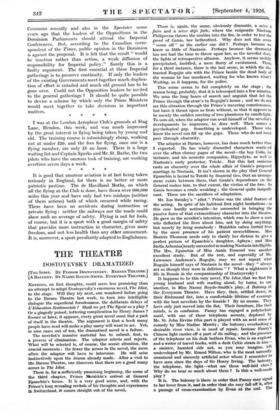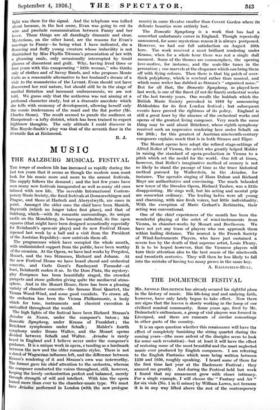THE THEATRE
DOSTOYEVSKY DRAMATIZED
NOTHING, on first thoughts, could seem less promising than an attempt to adapt Dostoyevsky's enormous novel, The Idiot, to the stage. Will they try next, one wondered before going to the Barnes Theatre last week, to turn into intelligible dialogue the superficial formlessness, the deliberate delays of L'Education Sentimentale I Shall we get The Egoist as a play ? Or a gingerly poised, tottering complication by Henry James ? Sooner or later, it appears, every great novel must find a part of itself in the theatre. The argument is that a book many people have read will make a play many will want to see. Yet, in nine ene-Ps out of ten, the dramatized novel is a failure.
The novelist's massive material has to submit, first, to a process of elimination. The adaptor selects and rejects. What will be selected is, of course, the scenic situation, the crucial moments : the fewer the Scenes in the novel, the more often the adaptor will have to intervene. He will seize instinctively upon the drama already made. After a visit to the Barnes Theatre, one discovers that there are a good many scenes in The Idiot.
There is, for a sufficiently promising beginning, the scene of the third chapter, Prince MuishIcin's arrival at General Epanchin's house. It is a very good scene, and, with the Prince's long revealing recitals of his thoughts and experiences In Switzerland, it comes straight out of the novel. There is, again, the scene, obviously dramatic, a scene 4 faire and a scene WO faite, where the enigmatic Nastasia
Philipovna throws the roubles into the fire, in order to test the greed of Gania, her bethrothed. Why does not this seece "come off" as the earlier one did ? Perhaps because we know so little of Nastasia. Perhaps because the dramatist has not had the time to throw upon her, as the novelist does,
the lights of retrospective allusion. Anyhow, it seems unduly precipitated, huddled, a mere flurry of excitement. Then, for a third instance, there is the last scene, in which the dis. tracted Rogojin sits with the Prince beside the dead body of the woman he has murdered, waiting for who knows what ? Waiting, as it happens, for the police.
This scene seems to fail completely on the stage ; the reason being, probably, that it is telescoped into a few minutes. We miss the long hours of search and anguish that led the
Prince through the strees to Rogojin's house ; and we do not
see this situation through the Prince's wavering consciousness, but have it thrust upon us from without, so that it appears to
be merely the sudden meeting of two phantoms by candlelight.
To sum all, when the adaptor can avail himself of the novelist's developments he impresses, he does well. Then comes a
psychological gap. Something is undeveloped. Those who know the novel can fill up the gaps. Those who do not must peer through obscurity.
The adaptor at Barnes, however, has done much better ttan I expected. He has wisely discarded characters scatterd over the often clumsy pages of the novel—the boy Colia, J%r instance, and his neurotic companion, Ilippolyte, as well
Nastasia's early protector, Totski. But this last omission casts an obscurity over the whole affair of Gania's proposed marriage to Nastasia. It isn't shown in the play that General Epanchin is bound to Totski by financial ties, that an arrange- ment exists between them, that Gania's dependence on the General makes him, to that extent, the victim of the two. So Gania becomes a crude weakling ; the General quite insignifi- cant. These are the sacrifices of adaptation.
Mr. Ion Swinley's " idiot " Prince was the chief feature of the acting. In spite of his habitual first night hesitations—in
this case hardly noticeable—he succeeded in bringing the
passive force of that extraordinary character into the theatre. He gave us the novelist's intention, which was to show a man
who deflected the lives about him, not by doing anything, but merely by being somebody : Muishkin calms turbid lives by the mere presence of his patient unworldliness. Miss Beatrix Thomson needs only to clarify her diction to give a
perfect picture of Epanchin's daughter, Aglaya ; and Miss Stella Arbenina:ne,arly succeeded in making Nastasia intelligible.
The Mrs. Epanchin of Miss Annie Esmond was another excellent study. But of the rest, and especially of Mr. Lawrence Anderson's Rogojin, may we not repeat what Rogojin himself says of Nastasia in the novel—they "always act as though they were in delirium " ? What a nightmare is life in Russia in the companionship of Dostoyevsky I
It happens to be this very novel, The Idiot, that we find the young husband and wife reading aloud, by turns, to one another, in Miss Naomi Royde-Smith's play, A Balcony, at the Everyman Theatre. Have they, then, settled down, in their Richmond fiat, into a comfortable lifetime of evenings with the best novelists by the fireside ? By no means. They have only just moved into the flat. Their furniture, like their minds, is in confusion. Fanny has engaged a polytechnic maid, with one of those telephone accents, deplored by Mr. St. John Ervine (this part is played with an acid sense of comedy by Miss Nadine March) ; the balcony, overlooking a desirable river view, is in need of repair, because Fanny's Chinese light carries off a part of its railing ; and the presence of the telephone on his desk bothers Evan, who is an explorer and a writer of travel books, with a dark Celtic strain in hint- s sinister, haunted side not, as you may imagine, left undeveloped by Mr. Ernest Milton, who is the most naturanY unnatural and sincerely artificial actor whom I remember to have seen since the days of Sir Henry Irving. The balconYi the telephone, the light—what are these well-laid clues ? Why do we hear so much about them ? Is this a well-made play ? It is. The balcony is there in order that Fanny may signal to her lover from it, and in order that she may fall off it, after a passage of cross-examination by Evan at the end. The right was there for the signal. And the telephone was talked about because, in the last scene, Evan was going to cut its wire and preclude communication between Fanny and her lover. These things are all dazzlingly dramatic and clear. Mysterious, on the other hand, are the reasons for Evan's marriage to Fanny—he being what I have indicated, she a flouncing and fluffy young creature whose imbecility is not diminished by Miss Phyllis Titmuss's presentation of her with a gleaming smile, only occasionally interrupted by timid lances of discontent and guilt. Why, having lived three or four years with this exasperating "little woman," who thinks only of clothes and of Savoy Bands, and who proposes Monte Carlo as a reasonable alternative to her husband's dream of a visit to the monasteries of the Levant, Evan should not have discovered her real nature, but should still be in the stage of marital flirtation and incessant embraeements, we are not told. We guess only that the authoress was not aiming at a profound character study, but at a dramatic anecdote whieh she tells with economy of development, allowing herself only the comic irrelevances of the maid and the flat porter (Mr. Charles Stone). The result seemed to puzzle the audience at Hampstead—a lofty district, which has been trained to expect highbrow thoughts. The only altitude I could discover in Miss Royde-Smith's play was that of the seventh floor in the riverside flat at Richmond.
R. J.



































 Previous page
Previous page